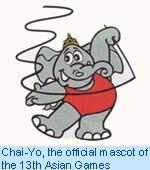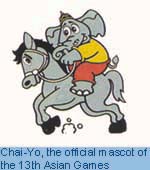December 1998 Wharf Cable only13th Asian GamesBy Teny Siu
The 13th Asian Games will kick off in Bangkok on the
sixth of December.
Competition is not confined inside the stadium.
It is equally hectic in the local media industry.
The bad news is, households who have not subscribed
to Wharf Cable TV cannot watch this international sports event at home.
Wharf Cable, which at present has a subscription base
of about 400,000 households in Hong Kong, owns the exclusive right to broadcast
the 13th Asian Games.
In other words, Television Broadcast Limited and
Asia Television Limited, the two major terrestrial television stations with 99%
penetration in Hong Kong, are excluded from broadcasting the event.
"It is a great pity," said Mr. Richard Read,
international affairs manager of TVB.
"It is the first Asian Games after the change of sovereignty,
and Lee Lai-shan will probably
win another gold medal in windsurfing. Many Chinese athletes will also take part in track and
field and swimming," he said.
However, these moments will not be shown on TVB nor ATV.
Wharf Cable has spent a large sum of money to bid for
the broadcasting rights and install underground cables, and it didnít sub-license
this right to other television stations.
Its exclusive right is protected by the contract signed
with International Sports and Leisure, a sports distribution agent.
"In my view, it is an anti-competition strategy of
Wharf Cable," said Mr. Read.
Another terrestrial television station, ATV,
adopts a more realistic approach. "It is the reality that we have to accept,"
a spokesperson of ATV said, "Wharf Cable has their own stance."
"According to the free market mechanism, if Wharf Cable
thinks that the money paid for the rights is worthwhile and it can utilize the
event completely, that's their own business," she said.
Wharf Cable was not available for comment.
According to Dr. Alice Lee, professor of the
Department of Journalism at Hong Kong Baptist
University, the problem originates from the attitude of the organizers of the sports
events and the media.
"The organizers are more and more inclined to commercialise
the events. This phenomenon of sports commercialization is eroding the true spirit
of sports, such as the ideal of sportsmanship.
"Nowadays, every sports event in the world is just
like a show. The Mass media have great influence on the time schedule and venues
of a sports event," she said.
For example, the opening and closing ceremonies of the
Asian Games and the Olympic Games were originally
simple ceremonies before the athletes enter the stadium.
"Nevertheless, as television stations broadcast
these ceremonies worldwide, additional elements and performances were included,
and the ceremonies became important events themselves.
"For the media, ratings and commercial benefits are
their ultimate concern. Their objectives are virtually naked.
"Because of that, the broadcasting rights of many major
sports events are often monopolized by a single television station," she said.
Sports and news are the flagship programs for Wharf Cable,
while sports programs are especially vital for its survival.
Therefore, Wharf Cable spends a lot of money on bidding
for the broadcasting rights for international sports events so as to widen
the subscription base, its main source of revenue.
Dr. Lee commented that Wharf Cable's action this time
was 'quite aggressive'.
"We cannot blame TVB and ATV for not bidding
for the rights. They made this decision only because they think it isn't worth
paying such an inflated price, and this is the rule of the game," added she.
Mr. Read of TVB is discontented with the present rules.
He said, "Sports is the one of the major talking points
of the public. Just see how many newspaper readers turn to the sports page before
they read the news headlines, and how many people own the jerseys of Manchester United.
"People show interest in sports even if they do not
watch sports programs. So sports events should be open to the public."
However, public awareness of this issue is not very
high at this moment.
Said Dr. Alice Lee: "Media literacy of the public
should be raised.
"If awareness of the audience is high enough, they
will express their opinions actively when their rights are deprived.
"If there is general public discontent, TVB and ATV
would be more cautious," she added.
Mr. Read agreed: "The13th Asian Games is a test for
public reactions. We want feedback from the public as it can act as a pressure
to force the government to take action."
"If the public are apathetic to the problem and
subscribe to Cable TV for the Asian Games, our argument of public interest
becomes weaker."
According to Ms Ko, spokesperson of the
Information Technology and Broadcasting
Bureau, this issue is purely a commercial one.
The Bureau is only responsible for ensuring that content
of television programs does not violate the existing regulations. It will not
interfere with the purchasing decisions of the television stations.
However, the spokesperson of ATV believes that the
government should treat the other television stations fairly, and consider the
interest of the public as top priority.
"If the government authorizes other TV stations to
broadcast suitable and valuable programs as well instead of favouring Wharf Cable
only, more viewers can benefit."
On the other hand, Mr. Read suggested the government
invite all the local broadcasters to discuss the issue, and that it should draw
some guidelines.
"Domination of sports programs by one single
broadcaster should be prohibited," he said, "and formation of a cartel by several
stations should also be prevented."
Given inadequate public awareness and the
government's policy of nonintervention, the local TV stations are trying to expand
their living space.
"We have to be patient," said Mr. Read.
The transfer of the right to broadcast matches under
Bundesliga, a German Soccer League, is inspirational to TVB.
Mr. Read said, "The right was originally owned by
Wharf Cable. As the price for broadcasting English Premier League matches escalated,
they made a trade-off and lowered the asking price for Bundesliga.
"After this, the agent from Germany negotiated a two year
contract with TVB instead. Bundesliga matches are now shown in TVB Jade at 8:30am
every Sunday."
The current economic turmoil can be regarded as an
advantage to TVB, as the subscription base of Wharf Cable may reduce due to the
economic downturn.
"Wharf Cable may no longer be able to pay an inflated
price," said Mr. Read.
In the long run, the road for broadcasting international
sports events is bumpy.
"How the broadcasting rights of sports events are
distributed depends very much on the organizers' policies. If they are considerate,
they will not sell it exclusively,"Dr. Alice Lee said.
"If not, everyone has to pay for the right to watch the programs."
Mr. Read echoed Dr. Lee's view. Said he:
"Once the franchise of cable television expires, and when the economic recession is over,
it is estimated that there will be more than two cable television operators
existing in the market.
"People will then have to decide which one to subscribe to.
If each of the operators gets the broadcasting right for only part of an event,
viewers may have to consider subscribing to both of them.People will then have to
decide which one to subscribe to. If each of the operators gets the broadcasting right
for only part of an event, viewers may have to consider subscribing to both of them.
"If the current circumstances remain unchanged, fewer and fewer
sports programs will be shown on terrestrial television stations, except for the
Olympic Games," he concluded.
| |

